Henry Baldwin (judge)
| Henry Baldwin | |
|---|---|
 |
|
| Associate Justice of the Supreme Court of the United States | |
|
In office January 6, 1830 – April 21, 1844 |
|
| Appointed by | Andrew Jackson |
| Preceded by | Bushrod Washington |
| Succeeded by | Robert Grier |
| Member of the U.S. House of Representatives from Pennsylvania's 14th district |
|
|
In office March 4, 1817 – May 8, 1822 |
|
| Preceded by | John Woods |
| Succeeded by | Walter Forward |
| Personal details | |
| Born |
January 14, 1780 New Haven, Connecticut, U.S. |
| Died | April 21, 1844 (aged 64) Philadelphia, Pennsylvania, U.S. |
| Political party |
Democratic-Republican (Before 1825) Democratic (1828–1844) |
| Education |
Yale University (BA) Litchfield Law School |
Henry Baldwin (January 14, 1780 – April 21, 1844) was an Associate Justice of the Supreme Court of the United States from January 18, 1830, to April 21, 1844.
Descended from an aristocratic British family dating back to the seventeenth century, Baldwin was born in New Haven, Connecticut, the son of Michael Baldwin and Theodora Walcott. He is the half-brother of Abraham Baldwin. He attended Hopkins School, and received a B.A. at age 17 from Yale College in 1797. He also attended Litchfield Law School and read law in 1798. Baldwin then moved to Pittsburgh and established a successful law practice. He invested in iron furnaces north of the city, which sparked a move to Crawford County, Pennsylvania, of which he was elected the newly formed jurisdiction's first district attorney and served from 1799 to 1801. He was also the publisher of The Tree of Liberty, a Republican newspaper.
After the death of his first wife, Marana Norton, Baldwin married Sally Ellicott. Baldwin was elected to the United States Congress as a member of the Democratic-Republican Party in 1816, representing Pennsylvania's 14th congressional district; he was reelected twice, but he resigned in May 1822 due to poor health. Before resigning from Congress in 1822, Baldwin planted the seeds of a future political alliance with General Jackson by advising that Congress drop an investigation of unsanctioned military aggression in Florida. In 1828, Jackson rewarded Baldwin’s political services in Pennsylvania and advisory role in the presidential campaigns of 1824 and 1828 by nominating him to the cabinet post of Secretary of the Treasury. Jackson’s first attempt at nomination was blocked in the Senate by then Vice President John Calhoun, largely because of Baldwin’s strong position in favor of high-tariff policy. Baldwin served in this role until late 1829. His political popularity can be traced to his private investment in the economic growth of Pittsburgh. In the House, he was a prominent advocate of protective tariffs. He received support from Independent Republicans and Federalists for his support of the protective tariff as a national measure. He strongly supported the election of Andrew Jackson in the election of 1824 and 1828. When Bushrod Washington died after thirty-two years of service, the president turned to Baldwin to replace him. On January 6, 1830, the Senate approved Baldwin’s nomination 41:2 despite the efforts of the Calhoun forces. The only dissenters were two Senators from Calhoun’s home state of South Carolina.
...
Wikipedia
